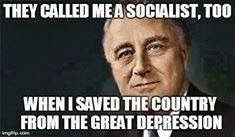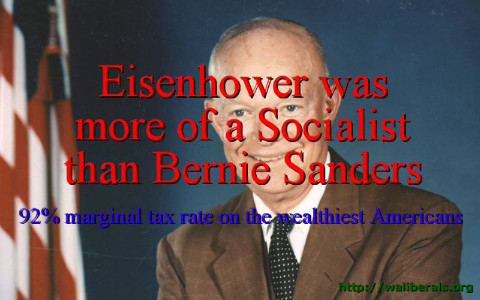2016 Postmortem
Related: About this forumBernie is a Democratic Socialist, let's see who else was
10 Surprising People Who Advocated Socialism
Martin Luther King Jr., Activist And Pastor

Nelson Mandela, Resistance Fighter And Politician

George Orwell, Author And Journalist

Pablo Picasso, Painter

Helen Keller, Author And Activist

Albert Einstein, Physicist

http://listverse.com/2014/05/13/10-surprising-people-who-advocated-socialism/
Democratic Socialism Has Deep Roots in American Life
The shock and disbelief with which many political pundits have responded to Bernie Sanders’s description of himself as a “democratic socialist”—a supporter of democratic control of the economy—provide a clear indication of how little they know about the popularity and influence of democratic socialism over the course of American history.
http://historynewsnetwork.org/article/161058#sthash.Ju4CEDDN.dpuf
UglyGreed
(7,661 posts)In a highly anticipated speech, Sen. Bernie Sanders passionately detailed what being a democratic socialist means to him and would mean for Americans if elected president.
After listing many metrics showing Americans today are working harder than ever yet facing undue pressures to pay for necessities like housing, healthcare, higher education and retirement, Sanders said democratic socialism means reviving the wisdom and policies behind President Franklin D. Roosevelt’s New Deal, Lyndon Johnson’s Great Society and Rev. Martin Luther King’s call for economic justice.
“Real freedom must include economic security,” Sanders said, quoting FDR’s 1944 speech calling for a second Bill of Rights for economic justice. “That was Roosevelt’s vision 70 years ago. It is my vision today. It is a vision that we have not yet achieved. And it is time that we did.”
“People are not free,” he continued. “They are not truly free when they are unable to feed their family. They are not truly free when they are unable to retire with dignity. They are not truly free when they are unemployed, underemployed or when they are exhausted by working 60, 70 hours a week. People are not truly free when they don’t know how they are going to get medical help, when they or a family member are sick.”
“So let me define for you, simply and straightforwardly, what democratic socialism means to me,” Sanders said. “It builds on what Franklin Delano Roosevelt said when he fought for guaranteed economic rights for all Americans. And it builds on what Martin Luther King, Jr. said in 1968 when he stated that, ‘This country has socialism for the rich, and rugged individualism for the poor.’ My view of democratic socialism builds on the success of many other countries around the world, who have done a far better job than we have in protecting the needs of their working families, their elderly citizens, their children, their sick and their poor.”
http://www.salon.com/2015/11/21/bernie_sanders_12_best_reasons_for_being_a_democratic_socialist_partner/
Stuart G
(38,436 posts)Most of the book, is a call to "democratic socialism" and the true evils of capitalism. About 10 -12 pages talk about the awful conditions in the meat packing industry. That setting in Chicago in 1906, is where an immigrant is followed on his journey as a worker in the packing plants to a view of a new political ideology . That journey is totally lost on the incredible description of how awful conditions for workers are as well as the way the food produced in those plants. The Jungle was responsible for the Pure Food and Drug Act being passed in 1906. Nevertheless, most of the book is about that journey and Sinclair view of why the socialistic view is superior to the selfish capitalistic one.

retread
(3,762 posts)got them right in the stomach."
cyberswede
(26,117 posts)valerief
(53,235 posts)UglyGreed
(7,661 posts)But hey, just like Bernie, I'm not an asshole ![]()
pacalo
(24,721 posts)
pacalo
(24,721 posts)wyldwolf
(43,867 posts)Chicago Democratic Socialist of America:
http://www.chicagodsa.org/thomasnewdeal.html
http://www.hoover.org/research/how-fdr-saved-capitalism
The new deal was a calculated system to save capitalism. Not replace it. Not reform it. And the Democratic Socialists and Progressives of the day knew it.
There were elements of socialism in the new deal, an obvious reaction to the times. But FDR was no socialist.
FDR was a one-percenter
Roosevelt's net worth in 1932 was $6o million (http://www.therichest.com/celebnetworth/politician/president/franklin-d-roosevelt-net-worth/)
In the New Deal there was a tug of war between those who favored a centrally planned economy and those who believed that a reliance on small business and decentralized economic power would bring about recovery. The decentralizers prevailed.
This belief in decentralized and democratic economic power characterized the most important reform of the Roosevelt era: Social Security.
Social Security, by guaranteeing income to elderly retired Americans, established the proposition that the individual has social rights.
But Roosevelt, against the advice of economic planners who would have made it solely a relief program for the poor, insisted on adding responsibilities by funding Social Security through taxes deducted from every wage earner's paycheck.
http://articles.latimes.com/1999/oct/25/news/ss-26179
He sensed a shift in the electoral mood in the early 1930s and went with it

http://books.google.com/books?id=z8wSCZG9O6AC&pg=PA406&lpg=PA406&dq=fdr+opportunist&source=bl&ots=uS-ItBAquz&sig=-g7THj75It4D9BiqplduDbcTr-o&hl=en&sa=X&ei=B4J2VLXvCs_ToASfiYDQAw&sqi=2&ved=0CFYQ6AEwCQ#v=onepage&q=fdr%20opportunist&f=false
... the most striking difference between the 1930s and the present day is that, by the standards of today’s political parlance, average Americans of the mid-1930s revealed downright “socialistic” tendencies in many of their views about the proper role of government.
http://www.pewresearch.org/2010/12/14/how-a-different-america-responded-to-the-great-depression/
National surveys suggest that the leftward shift in public opinion during the 1930s was even more extensive than indicated by third-party voting or membership in radical organizations.
http://www.hoover.org/research/how-fdr-saved-capitalism
FDR brushed aside these attacks in part by insisting that we were a rich nation that could “afford to pay for security and prosperity without having to sacrifice our liberties into the bargain.”
http://rooseveltinstitute.org/franklin-d-roosevelt-socialist-or-champion-freedom
He co-opted much of the left's rhetoric to keep progressive third party threats at bay
Franklin Roosevelt demonstrated his skill at co-opting the rhetoric and demands of opposition groups the year before his 1936 reelection, when the demagogic Senator Huey Long of Louisiana threatened to run on a third-party Share-Our-Wealth ticket. This possibility was particularly threatening because a “secret” public opinion poll conducted in 1935 for the Democratic National Committee suggested that Long might get three to four million votes, throwing several states over to the Republicans if he ran at the head of a third party. At the same time several progressive senators were flirting with a potential third ticket; Roosevelt felt that as a result the 1936 election might witness a Progressive Republican ticket, headed by Robert La Follette, alongside a Share-Our-Wealth ticket.
To prevent this, Roosevelt shifted to the left in rhetoric and, to some extent, in policy, consciously seeking to steal the thunder of his populist critics.
http://www.hoover.org/research/how-fdr-saved-capitalism
Progressives' of his day didn't care for him much
In fact, it's pretty remarkable how closely the attacks Roosevelt experienced from his left echo the attacks that liberals make against Obama today. (numerous links and examples follow...)
http://www.dailykos.com/story/2010/08/11/891631/-UPDATED-Liberal-Criticism-of-Franklin-Roosevelt-and-The-New-Deal#
Most women and minorities were excluded from the benefits of unemployment insurance and old age pensions. Employment definitions reflected typical white male categories and patterns.[6] Job categories that were not covered by the act included workers in agricultural labor, domestic service, government employees, and many teachers, nurses, hospital employees, librarians, and social workers.[7] The act also denied coverage to individuals who worked intermittently.[8] These jobs were dominated by women and minorities. For example, women made up 90 percent of domestic labor in 1940 and two-thirds of all employed black women were in domestic service.[9] Exclusions exempted nearly half of the working population.[8] Nearly two-thirds of all African Americans in the labor force, 70 to 80 percent in some areas in the South, and just over half of all women employed were not covered by Social Security.[10][11] At the time, the NAACP protested the Social Security Act, describing it as “a sieve with holes just big enough for the majority of Negroes to fall through.”[11]
http://en.wikipedia.org/wiki/History_of_Social_Security_in_the_United_States#Initial_opposition
http://www.shmoop.com/fdr-new-deal/race.html
He didn't intend for welfare to be a permanent government expenditure.
The Federal Government must and shall quit this business of relief.
http://www.presidency.ucsb.edu/ws/?pid=14890
He was propagandist
http://www.thenation.com/article/fdrs-democratic-propaganda#
He was a warmonger.
http://en.wikipedia.org/wiki/Criticism_of_Franklin_D._Roosevelt#Criticism_of_Roosevelt_as_a_.22Warmonger.22
a great president in a profession where the bar is set pretty low. Certainly not the progressive hero the left has made him out to be.
pacalo
(24,721 posts)wyldwolf
(43,867 posts)Ichingcarpenter
(36,988 posts)In 1942, during World War II, US President Franklin D. Roosevelt proposed a maximum income of $25,000 during the war:[5][6]
At the same time, while the number of individual Americans affected is small, discrepancies between low personal incomes and very high personal incomes should be lessened; and I therefore believe that in time of this grave national danger, when all excess income should go to win the war, no American citizen ought to have a net income, after he has paid his taxes, of more than $25,000 a year. It is indefensible that those who enjoy large incomes from State and local securities should be immune from taxation while we are at war. Interest on such securities should be subject at least to surtaxes.
This was proposed to be implemented by a 100% marginal tax on all income over $40,000 (after-tax income of $25,000). While this was not implemented, the Revenue Act of 1942 implemented an 88% marginal tax rate on income over $200,000, together with a 5% "Victory Tax" with post-war credits, hence temporarily yielding a 93% top tax rate (though 5% was subsequently returned in credits
https://en.wikipedia.org/wiki/Maximum_wage#History
That amount would be around $350,000 today
and we've been at war for longer than ww2
cascadiance
(19,537 posts)
liberal_at_heart
(12,081 posts)UglyGreed
(7,661 posts)I'm glad we both think Mandela was a great man.
Donkees
(31,418 posts)AzDar
(14,023 posts)madokie
(51,076 posts)and always have been.
UglyGreed
(7,661 posts)many people are but were afraid to say so do to the propaganda during the cold war. It does pop up every now and then and we have even seen it in some posts here.